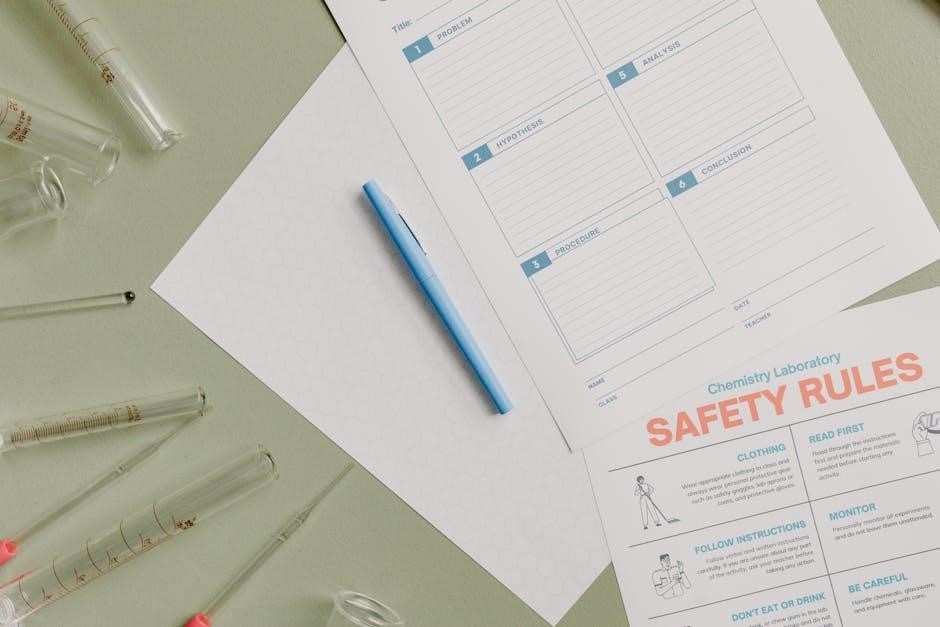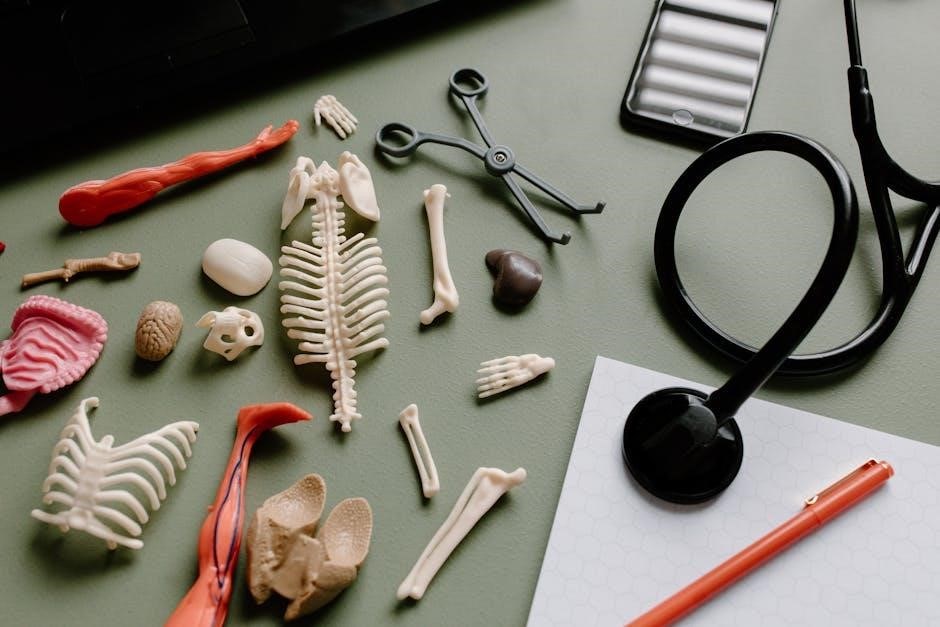Nursing study guides are essential resources that help students grasp key concepts‚ develop practical skills‚ and stay organized‚ making them indispensable for nursing education and professional growth.
1.1 Overview of Nursing Study Guides
Nursing study guides are comprehensive resources designed to simplify complex concepts‚ offering structured learning materials. They cover essential topics‚ from anatomy to pharmacology‚ and provide practical tips for mastering nursing skills. These guides often include notes‚ diagrams‚ and practice questions‚ catering to various learning styles and helping students stay organized and focused throughout their nursing education journey.
1.2 Importance of Study Guides in Nursing Education
Nursing study guides play a pivotal role in education by enhancing understanding and retention of complex concepts. They provide structured learning materials‚ practical tips‚ and exam preparation strategies‚ helping students master essential skills. These guides also foster critical thinking and clinical application‚ ensuring students are well-prepared for both academic and professional challenges in the nursing field. They are indispensable for success.

Key Components of Nursing Study Guides
Nursing study guides typically include anatomy‚ physiology‚ pharmacology‚ and clinical procedures‚ ensuring a comprehensive understanding of fundamental concepts and practical skills essential for nursing practice and education.
2.1 Anatomy and Physiology Basics
Anatomy and physiology form the foundation of nursing education. Study guides provide detailed overviews of body systems‚ organs‚ and functions‚ enabling nurses to understand how the human body operates and respond effectively to health issues. These sections often include diagrams and summaries to facilitate memorization and practical application in clinical settings‚ ensuring a solid knowledge base for patient care.
2.2 Pharmacology Essentials
Pharmacology sections in nursing study guides cover drug classifications‚ mechanisms of action‚ dosages‚ and side effects. They emphasize safe administration practices and patient monitoring‚ ensuring nurses can deliver medications effectively while minimizing risks. These guides also highlight drug interactions and contraindications‚ providing a comprehensive understanding of pharmacological principles necessary for evidence-based practice in various clinical scenarios.
2.3 Nursing Skills and Procedures
Nursing study guides detail essential skills and procedures‚ such as patient assessments‚ vital sign monitoring‚ and medication administration. They also cover advanced techniques like IV insertion and wound care. These guides provide step-by-step instructions and visual aids‚ helping students master clinical skills and apply them confidently in real-world patient care scenarios.
Effective Study Strategies for Nursing Students
Nursing students benefit from active learning‚ time management‚ and using flashcards to memorize key concepts‚ ensuring they stay focused and retain information effectively for exams and clinical practice.
3.1 Time Management Tips
Effective time management is crucial for nursing students. Create a study schedule‚ prioritize tasks‚ and allocate specific hours for each subject. Balance study with personal time to avoid burnout. Use digital calendars or planners to organize deadlines and assignments. Focus on active learning techniques‚ such as attending webinars or participating in study groups‚ to enhance retention. Regular breaks can help maintain focus and productivity.
3.2 Active Learning Techniques
Active learning engages nursing students beyond passive reading. Techniques include participating in group discussions‚ attending workshops‚ and using interactive tools like flashcards. Simulations and case studies provide hands-on experience‚ enhancing understanding and retention. Encourage peer teaching and problem-solving activities to foster critical thinking and collaboration‚ making learning dynamic and effective for future nursing practice.
3.3 Using Flashcards for Memorization
Flashcards are a powerful tool for nursing students to memorize key terms and concepts. Write terms on one side and definitions or explanations on the other. Regular review helps reinforce memory‚ especially for pharmacology and anatomy. Digital flashcard apps allow easy access and tracking‚ making memorization efficient and portable for busy nursing schedules and exam preparation.

Scope of Practice in Nursing
Scope of practice in nursing defines the legal boundaries of patient care services that nurses can perform based on their education‚ training‚ and licensure‚ ensuring safe and ethical care delivery in all healthcare settings.
4.1 Understanding Professional Boundaries
Professional boundaries in nursing are essential for maintaining respectful‚ ethical relationships with patients. Nurses must balance empathy with objectivity‚ avoiding over-involvement or under-involvement. Clear communication and adhering to ethical guidelines help establish trust while protecting both patients and nurses from potential misunderstandings or conflicts of interest.
4.2 Legal and Ethical Considerations
Nursing practice is governed by legal and ethical frameworks that ensure patient safety and rights. Nurses must adhere to laws‚ professional standards‚ and ethical principles like confidentiality‚ autonomy‚ and beneficence. Understanding these considerations is crucial for providing high-quality‚ lawful care and avoiding legal consequences while upholding the integrity of the nursing profession.

Utilizing Online Resources for Nursing Studies
Nursing study guides emphasize the importance of online resources‚ providing accessible‚ reliable information for education and practice. These tools support evidence-based learning and clinical decision-making efficiently.
5.1 Recommended Websites for Nursing Students
Recommended websites for nursing students include the American Nurses Association (ANA)‚ Nurse.com‚ and the National Institute of Nursing Research. These sites offer evidence-based resources‚ practice exams‚ and clinical guidelines. They also provide updates on nursing trends‚ professional development‚ and continuing education opportunities. Utilizing these platforms can enhance learning and support academic success effectively.
5.2 How to Conduct a Literature Search
Start with a clear title and define all terms. Use specific keywords and Boolean operators to refine your search. Access reputable databases like PubMed or CINAHL. Evaluate sources for credibility and relevance. Organize findings systematically to support your research goals. Regularly update your search to include the latest studies and evidence-based practices.
The Nursing Process
The nursing process is a systematic approach to patient care‚ involving assessment‚ diagnosis‚ planning‚ implementation‚ and evaluation to ensure individualized and effective outcomes.
6.1 Assessment and Diagnosis
Assessment and diagnosis are critical steps in the nursing process. Assessment involves gathering patient data‚ while diagnosis identifies specific health issues. These steps ensure personalized care plans‚ addressing physical‚ emotional‚ and social needs. Nurses use observation‚ interviews‚ and medical tests to collect accurate information‚ enabling effective decision-making and targeted interventions.
6.2 Planning and Implementation
Planning and implementation involve creating personalized care plans based on patient needs and priorities. Nurses coordinate interventions‚ delegate tasks‚ and ensure evidence-based practices. This phase requires clear communication and collaboration with the healthcare team to deliver safe‚ effective care‚ addressing both immediate and long-term goals while documenting progress and adjustments in the care plan.
6.3 Evaluation of Patient Care
Evaluation of patient care involves assessing the effectiveness of interventions and outcomes. Nurses compare patient progress with established goals‚ documenting achievements and identifying areas for improvement. This step ensures accountability‚ informs future care decisions‚ and promotes high-quality‚ patient-centered outcomes‚ aligning with evidence-based practices and professional standards in nursing.
Nursing Care Plans
Nursing care plans document patient needs and guide care delivery through a structured‚ five-step framework‚ ensuring personalized‚ evidence-based interventions for optimal outcomes and improved patient well-being.
7.1 Creating Effective Care Plans
Creating effective care plans involves assessing patient needs‚ setting realistic goals‚ and outlining clear interventions. They should be patient-centered‚ evidence-based‚ and regularly updated to reflect progress and changing priorities‚ ensuring comprehensive and tailored care delivery that promotes positive health outcomes and improves quality of life for patients.
7.2 Documenting Patient Needs and Outcomes
Accurate documentation of patient needs and outcomes ensures continuity of care‚ tracks progress‚ and supports legal compliance. It involves recording baseline assessments‚ treatment responses‚ and goal achievements‚ providing a clear communication tool for healthcare teams and facilitating informed decision-making to enhance patient care quality and accountability.
Tips for Mastering Nursing School
Nursing school requires dedication and strategic planning. Develop a study schedule‚ practice critical thinking‚ and seek support to manage the rigorous curriculum effectively.
8.1 Building a Study Schedule
A well-structured study schedule helps nursing students manage their time effectively. Allocate specific blocks for each subject‚ allowing time for review and practice. Prioritize challenging topics and ensure regular breaks to maintain focus and prevent burnout. Consistency is key to retaining information and performing well in exams.
8.2 Collaborative Learning with Peers
Collaborative learning with peers enhances understanding and retention‚ as students share knowledge and insights. Group activities‚ such as study groups or discussions‚ foster teamwork and problem-solving skills. Encouraging open communication and shared resources‚ peer collaboration helps clarify doubts and strengthens clinical reasoning‚ preparing students for real-world nursing challenges more effectively than solitary study.
Professional Development in Nursing
Nursing study guides support professional growth by providing resources for continuous learning‚ specialization‚ and adapting to healthcare advancements‚ ensuring nurses stay competent and updated in their field.
9.1 Continuing Education Requirements
Nursing study guides play a crucial role in meeting continuing education requirements by offering structured content‚ ensuring nurses stay updated with industry standards and advancements‚ which is essential for maintaining licensure and delivering high-quality patient care effectively.
9.2 Specializing in a Nursing Field
Nursing study guides cater to various specialties‚ such as pediatrics or oncology‚ providing focused insights and practical knowledge. They enable nurses to deepen their expertise‚ enhancing patient outcomes and advancing their careers in specific areas of healthcare‚ making specialization more accessible and effective through tailored educational resources.

The Role of Technology in Nursing Studies
Technology enhances nursing education through AI tools‚ digital platforms‚ and apps‚ streamlining research‚ note-taking‚ and collaboration‚ while providing accessible resources for modern nursing studies and practice.
10.1 AI-Powered Tools for Note-Taking and Research
AI-powered tools simplify note-taking and research for nursing students by enhancing efficiency and accuracy. These tools can summarize complex topics‚ organize notes‚ and provide instant access to relevant materials‚ aiding in effective learning. Additionally‚ they offer real-time research assistance‚ ensuring students have the most up-to-date information‚ which is crucial for their studies and professional development.
10.2 Using Digital Platforms for Study Groups
Digital platforms provide nursing students with collaborative spaces to discuss complex topics‚ share resources‚ and engage in peer-to-peer learning. These tools foster teamwork and communication‚ enhancing understanding of key concepts. Regular study group sessions on these platforms can significantly improve retention and preparation for exams‚ making them invaluable for academic success in nursing programs.
Understanding the Nursing Practice Act
The Nursing Practice Act defines the legal and ethical framework guiding nursing professionals‚ ensuring patient safety‚ and maintaining high standards of care within the healthcare system.
11.1 Texas Nursing Practice Act (NPA)
The Texas Nursing Practice Act (NPA) is defined by the Texas Legislature to protect public health‚ safety‚ and welfare by setting standards for nursing practice. It outlines the scope of practice‚ ethical guidelines‚ and responsibilities for nurses‚ ensuring safe and competent care across all healthcare settings. Compliance with the NPA is mandatory for all nursing professionals in Texas.
11.2 Texas Board of Nursing (BON) Rules
The Texas Board of Nursing (BON) Rules regulate nursing education‚ licensure‚ and practice‚ ensuring compliance with the Nursing Practice Act. These rules protect patient safety and maintain professional standards. They address scope of practice‚ ethical conduct‚ and disciplinary actions‚ providing clear guidelines for nurses to adhere to while practicing in Texas. Adherence is mandatory for all nursing professionals.
Ethical Considerations in Nursing
Ethical considerations in nursing are crucial for maintaining patient trust and upholding professional integrity. They guide decision-making‚ ensuring care is delivered with compassion and respect.
12.1 Patient Advocacy and Confidentiality
Patient advocacy and confidentiality are cornerstone ethical principles in nursing. Nurses must act in patients’ best interests while safeguarding their personal information‚ ensuring trust and upholding legal standards in care delivery.
12.2 Ethical Decision-Making in Nursing Practice
Ethical decision-making in nursing involves applying principles like autonomy‚ beneficence‚ and justice to guide care. Nurses use critical thinking and ethical frameworks to address dilemmas‚ ensuring actions align with patient needs and professional standards. It requires staying informed on legal‚ cultural‚ and moral considerations to provide compassionate and responsible care‚ always acting ethically.
13.1 Staying Motivated Throughout Nursing School
Staying motivated in nursing school requires setting clear goals‚ celebrating milestones‚ and maintaining a healthy work-life balance. Engage with peers‚ seek mentorship‚ and remind yourself of the rewarding impact nursing has on lives. Use study guides to stay organized and focused‚ ensuring consistent progress toward your aspirations.
13.2 The Importance of Continuous Learning
Continuous learning is vital in nursing‚ as it ensures staying updated with medical advancements and best practices. Utilize study guides‚ online resources‚ and professional development opportunities to enhance knowledge and skills. This commitment fosters excellence in patient care‚ adapts to evolving healthcare needs‚ and supports lifelong professional growth in the nursing field.
